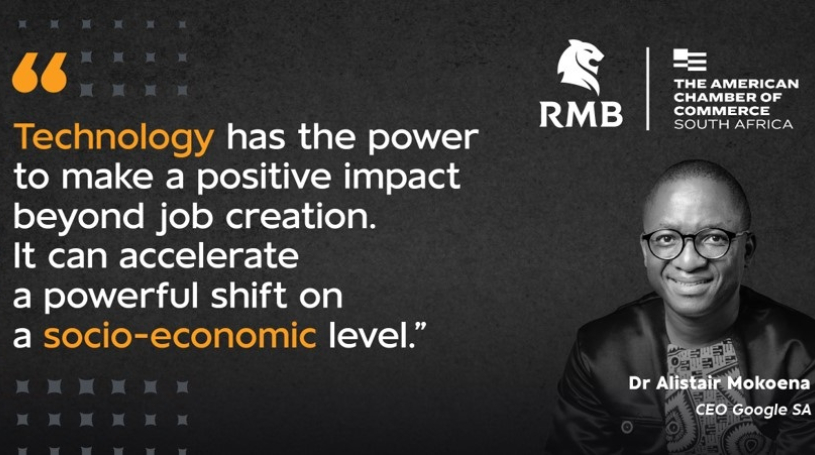Empowering South Africa: The AmCham-RMB Series on U.S. Corporate Impact feat. Google
Google SA – Using technology to stimulate economic growth in South Africa
The American Chamber of Commerce (AmCham) and RMB have partnered to showcase how U.S. companies are driving social and economic impact in South Africa and on the continent. This month we feature Google, a globally renowned brand, with a unique ability to make a significant economic impact in South Africa. By realising its mission to organise the world's information and make it universally accessible and useful, it stands to empower small businesses, drive digital education, and grow South Africa’s digital economy.
Dr Alistair Mokoena, CEO of Google says, “Africa’s best chance of leapfrogging economic development and driving exponential growth lies in the digital economy. However, there are some barriers to digital adoption that need to be removed before this becomes a reality. Digital penetration in the country only stands at more than 70%, meaning that 30% of South Africans still need to gain access to the internet. Looking at the continent, we estimate there will be another 300,000,000 users coming online in Africa by 2030.”
Providing better digital infrastructure on the continent
Mokoena states: “The first step to empowering people in South Africa and beyond with digital services is providing a reliable infrastructure. We need to provide faster, more affordable, more reliable internet connection on the continent, which is why Google has prioritised a billion-dollar investment across sub-Saharan Africa over a five-year period that began in 2021. The Equiano cable, made possible by this investment, promises to triple internet speed and decrease internet costs by 20%.”
Greater speed, access and improved latency will expand the African e-commerce market, connecting the continent to trade opportunities across the world. Google’s cable investment is expected to add $6.7 billion to South Africa’s GDP and add 180 000 indirect jobs resulting from the infrastructure’s widespread economic impact.
Google is also addressing the issue of data storage, and recently announced its investment in its first ever Google Cloud Region in Africa. Mokoena adds, “Our investment in a cloud region signals the importance of making cloud available for our partners, society, end users and our customers.” The introduction of Google’s Cloud Region is set to add $2 billion to South African’s GDP and 40,000 indirect jobs to the economy.
Meeting digital development with the right skills
Digital infrastructure can only have a powerful impact if people are given the skills to make the most of it. This extends from basic digital literacy programs to development and programming courses that empower South Africans to play a role in the digital economy.
Google has trained over 7,000,000 Africans with its Africa Digital Skills Program. In South Africa, it has partnered with the Department of Communication and Digital Technologies where it rolls out Coursera certificates that help unemployed graduates and youth to enter the labor market. It also collaborates with universities and tertiary institutions to influence curriculum development.
Mokoena says: “The world needs to feel the impact of African excellence, and to this end Google has recently launched a Google Product Development Center in Nairobi which will focus on giving African developers and engineers the resources to develop products for the rest of the world.”
Investing in SMEs, the lifeblood of African economies
Mokoena says, “Almost 90% of businesses on our continent are small businesses. More than half, 55% of the labor force in South Africa, is employed by small business, and 37% of our GDP comes from small business. This is the epicentre of job creation and economic development.”
Google supports small businesses in Africa through the Black Founders Fund and African Investment Fund. This support takes the form of non-dilutive grants and access to essential products and coaching.
In terms of digital payment, Google works hard to ensure that no local currency is excluded from the internet.
Next, it is working on equipping Google translate with the ability to translate the world’s languages. To date, it has translated 133 languages, including 8 of South Africa’s 12 official languages.
Looking to the future
Mokoena says, “Technology has the power to make a positive impact beyond job creation. It can accelerate a powerful shift on a socio-economic level and help us meet the United Nations (UN) Sustainable Development Goals (SDGs). For example, advancements in AI can promote food security and crop management by predicting locust migrations for farmers or assisting in identifying diseased crops. It can analyse historic weather patterns to predict climate events and help communities evacuate ahead of time. With drones and image recognition, the public health sector can trace and predict the migration of malaria-causing mosquitoes. The possibilities for technology to promote social change are exponential. Before this can happen, South Africa needs to invest in infrastructure, technology adoption, its people and its regulatory landscape.”
Companies like Google are pioneering in this space, bringing the best of global technology to the continent while celebrating, amplifying and empowering African excellence in technology.

